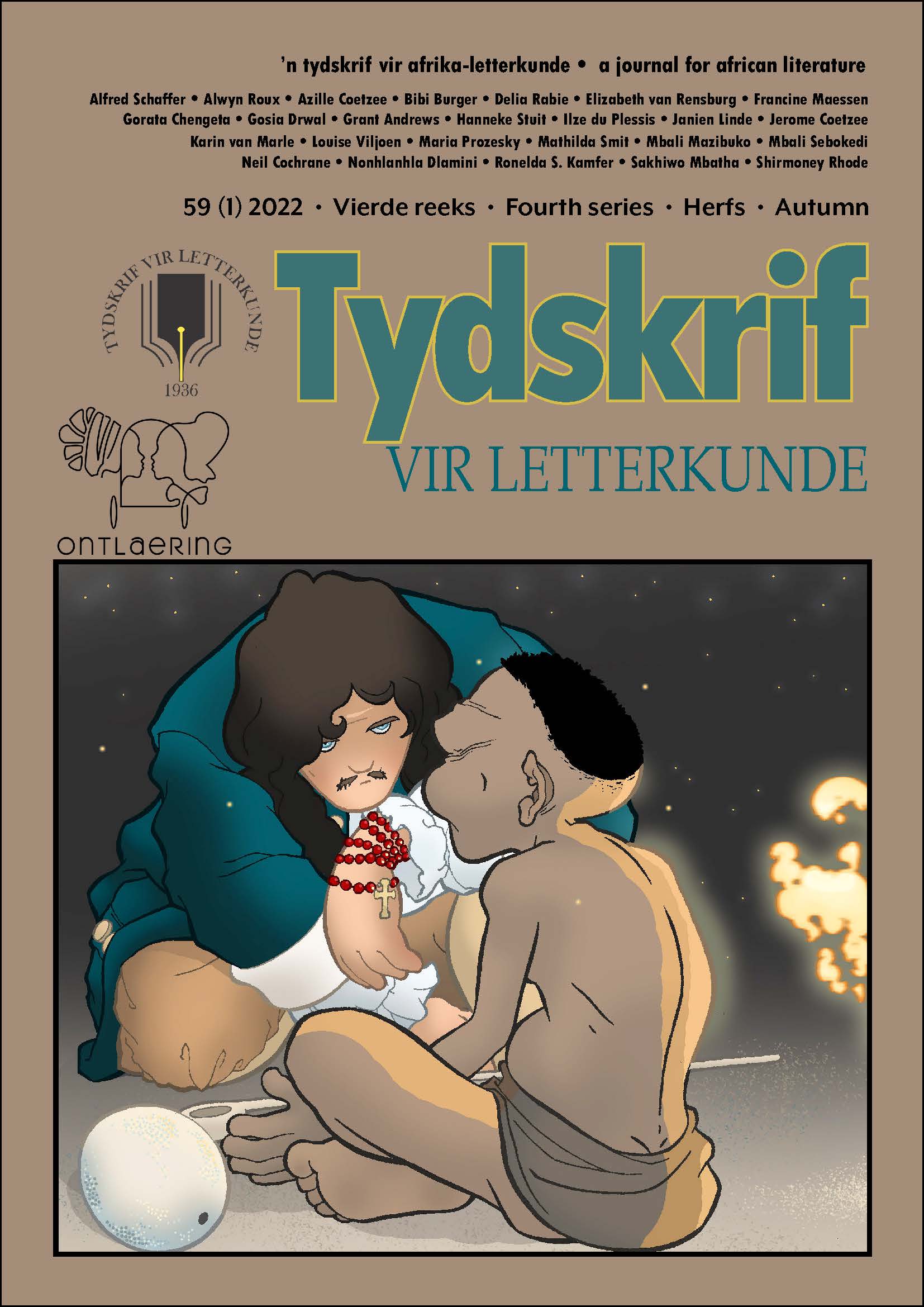Plaasfeminism in Ronelda S. Kamfer’s Kompoun (2021)
DOI :
https://doi.org/10.17159/tl.v59i1.13232Mots-clés :
plaas, feminism, rural idyll, loss, Ronelda S. Kamfer, Afrikaans literatureRésumé
This review article explores how Ronelda S. Kamfer’s novel Kompoun (2021) deconstructs and diversifies the white patriarchal space of the plaas (farm) by reinscribing it with a highly situated ‘plaasfeminism’ emerging from the female characters in the novel. This critical reinscription through the lives of the McKinney women from the Overberg is necessary, but certainly not triumphant. For Nadia, the protagonist, the idyll of the plaas consists of her admiration of and longing for her maternal forebears and thus provides a source of strength and personhood, but the plaas is also quite literally the scene of a crime from which her family fails to protect her. Kompoun complicates mainstream notions of feminist resistance by charting the internal contradictions of female subjectivity and highlighting the vulnerable position of the McKinney children, who grow up in a community where both adult men and women pose a threat of emotional and physical abandonment and abuse. Yet, in times of need, Nadia manages to mobilise her personal image of the plaas’ beauty as motherly and the women who live there as tough as coping strategies that suspend her imprisonment in the harmful dynamics around her.
Téléchargements
Références
Bonthuys, Marni. “Postkoloniale feminisme in die Afrikaanse poësie: Die debute van Ronelda S. Kamfer, Shirmoney Rhode en Jolyn Phillips.” LitNet Akademies vol. 17, no. 1, 2020, pp. 241–61. https://www.litnet.co.za/postkoloniale-feminisme-in-die-afrikaanse-poesie-die-debute-van-ronelda-s-kamfer-shirmoney-rhode-en-jolyn-phillips/.
Boswell, Barbara. And Wrote My Story Anyway: Black South African Women’s Novels as Feminism. Wits U P, 2020.
Burger, Bibi. “‘Our respect for water is what you have termed fear’: The Ocean in the Poetry of Ronelda S. Kamfer and Koleka Putuma.” Journal of Southern African Studies vol. 46, no. 1, 2020, pp. 23–38. https://doi.org/10.1080/03057070.2020.1697552.
Coetzee, J. M. White Writing. On the Culture of Letters in South Africa. Yale U P, 1988.
Eliot, T. S. The Wasteland and Other Writings. Digital Edition. Modern Library, 2001.
Gqola, Pumla, Dineo. Rape: A South African Nightmare. Digital Edition. MF, 2015.
Kamfer, Ronelda, S. “Jan Rabie & Malorie Wallace-lesing: Soos ’n koeipaal op die plaas.” LitNet. 26 Apr. 2018. https://www.litnet.co.za/jan-rabie-marjorie-wallace-lesing-soos-n-koeipaal-op-die-plaas/.
Kamfer, Ronelda, S. Kompoun. ’n Roman. Kwela, 2021.
Lewis, Desiree and Gabeba Baderoon. “Introduction: Being Black and Feminist.” Surfacing: On Being Black and Feminist in South Africa, edited by Desiree Lewis & Gabeba Baderoon. Wits U P, 2021, pp. 1–14.
Stuit, Hanneke. “The Ruins of the Rural Idyll: Reconfiguring the Image of the Farm in Homeland and Five Fingers for Marseilles.” Social Dynamics vol. 46, no. 3, 2020, pp. 561–79. DOI: https://doi.org/10.1080/02533952.2020.1858542.
Téléchargements
Publiée
Numéro
Rubrique
Licence
(c) Copyright Tydskrif vir Letterkunde 2022

Ce travail est disponible sous licence Creative Commons Attribution - Partage dans les Mêmes Conditions 4.0 International.


 https://orcid.org/0000-0001-6465-6584
https://orcid.org/0000-0001-6465-6584


.png)